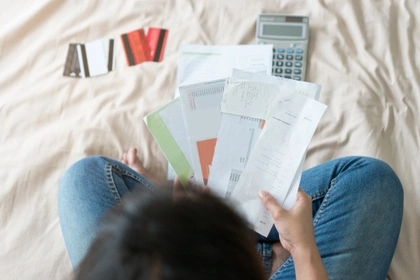What happens if you don’t pay your credit card in full?
If you don’t pay your credit card in full each month, interest will be added. Interest will normally be charged at a daily rate, and will show on your statement the following month. Bear in mind that late fees can also apply if you miss a payment or make less than the minimum payment.
You can avoid interest altogether if you clear your balance in full every month within your allotted grace period.
You’ll need to get in touch with your lender to find out if there’s a grace period on your credit card.
Learn more about interest in our simple APR guide.
What happens if I just make the minimum payment?
If you make at least the minimum payment on time every month you won’t receive any late fees.
But you need to remember that interest will accrue on your remaining balance. This will increase the cost of borrowing and the length of time it takes to pay your debt off in full. Interest will apply whether or not you have made any purchases with your card.
It works differently with 0% interest credit cards. You won’t pay any interest or charges (until the introductory period ends) - as long as you make the minimum payment on time, every time and don’t use it to withdraw cash.
Ocean Credit Card
See if it's a YES before you apply
- Up to £8,000 credit limit
- Checking won't affect your credit score
- Get a response in 60 seconds
Intelligent Lending Ltd (credit broker). Capital One is the exclusive lender.

How does my balance affect my credit score?
The most important thing to remember is to maintain your payments on time, every time. This will help build up your credit score and show lenders that you’re a responsible borrower.
Another way to improve your credit score is to reduce your credit utilisation rate. This is the balance you have accrued out of your total credit limit. Ideally, you want to be using no more than 30% of your credit limit across all forms of credit available to you. Spending over 30% of your credit limit can give lenders the impression that you are struggling.
Each lender uses their own criteria, but if it looks like you are relying too heavily on credit, this could potentially put them off accepting your future credit applications. Lenders want to make sure you can comfortably afford to repay them.
It’s also important that you don’t exceed your credit limit, as not only will this show on your credit file, you could also be charged a fee.
When should I pay my balance?
Always make sure that you pay your balance by the due date listed on your credit card statement. This applies whether you are making the minimum payment, or paying the full amount.
You can ask your lender to move the due date to a time of the month that is convenient for you. For example, you might prefer to make your payment just after payday.
As mentioned above, interest and charges can apply if you miss a payment, pay less than the minimum amount, or make a late payment. You can avoid this by setting up a Direct Debit or standing order for at least the minimum amount, so you never forget a payment in the future. (Just make sure you have enough funds set aside in your bank account to pay for this).
Can I make multiple payments in the same month?
Yes - you can make more than one payment a month towards your credit card. Check that you can afford to do so without neglecting your priority bills.
Making multiple payments in itself won’t increase your credit score, but the effects of doing so might help.
For instance, the more payments you make, the lower your balance will be. If you can get your balance-to-credit limit ratio down to 30% or lower it should improve your credit score, as mentioned above. Also, you will look like a responsible borrower who can manage your debt effectively, which will make you more attractive to lenders.
Disclaimer: We make every effort to ensure content is correct when published. Information on this website doesn't constitute financial advice, and we aren't responsible for the content of any external sites.




